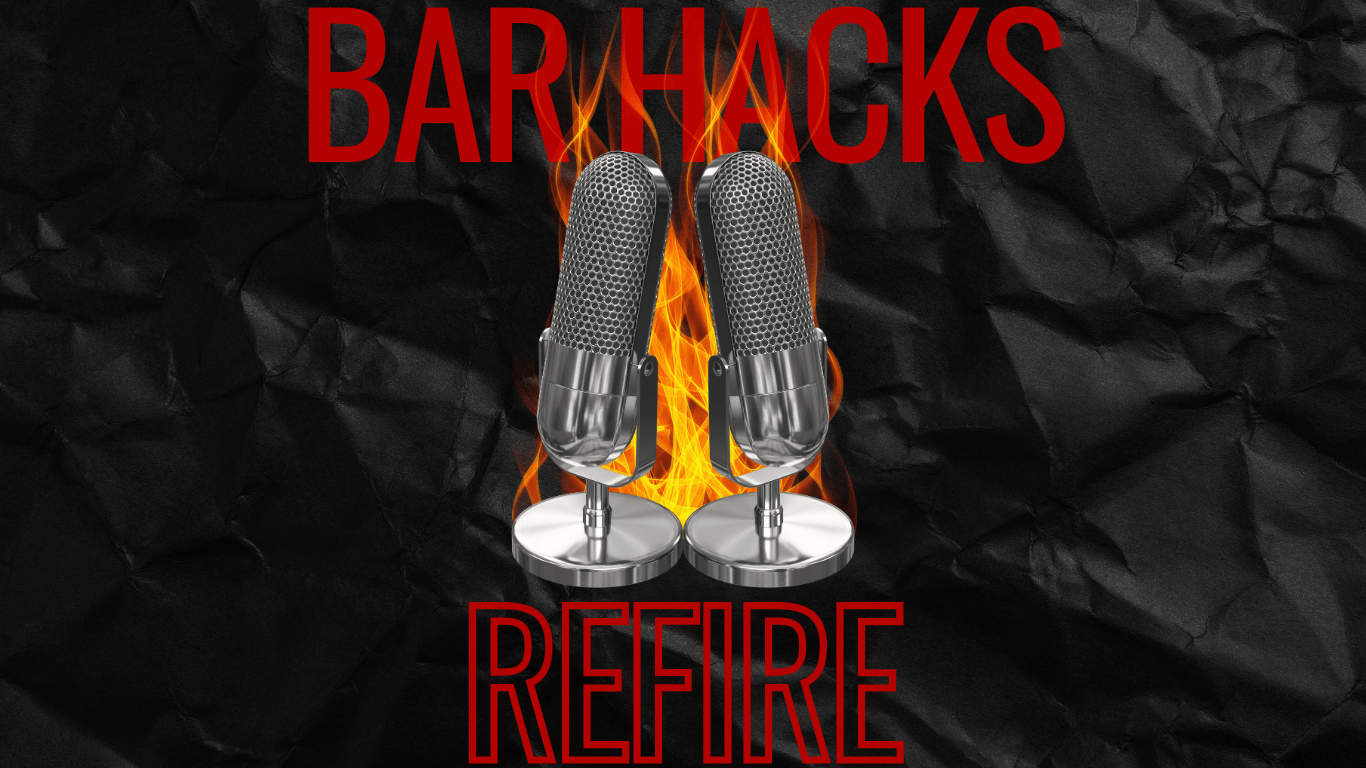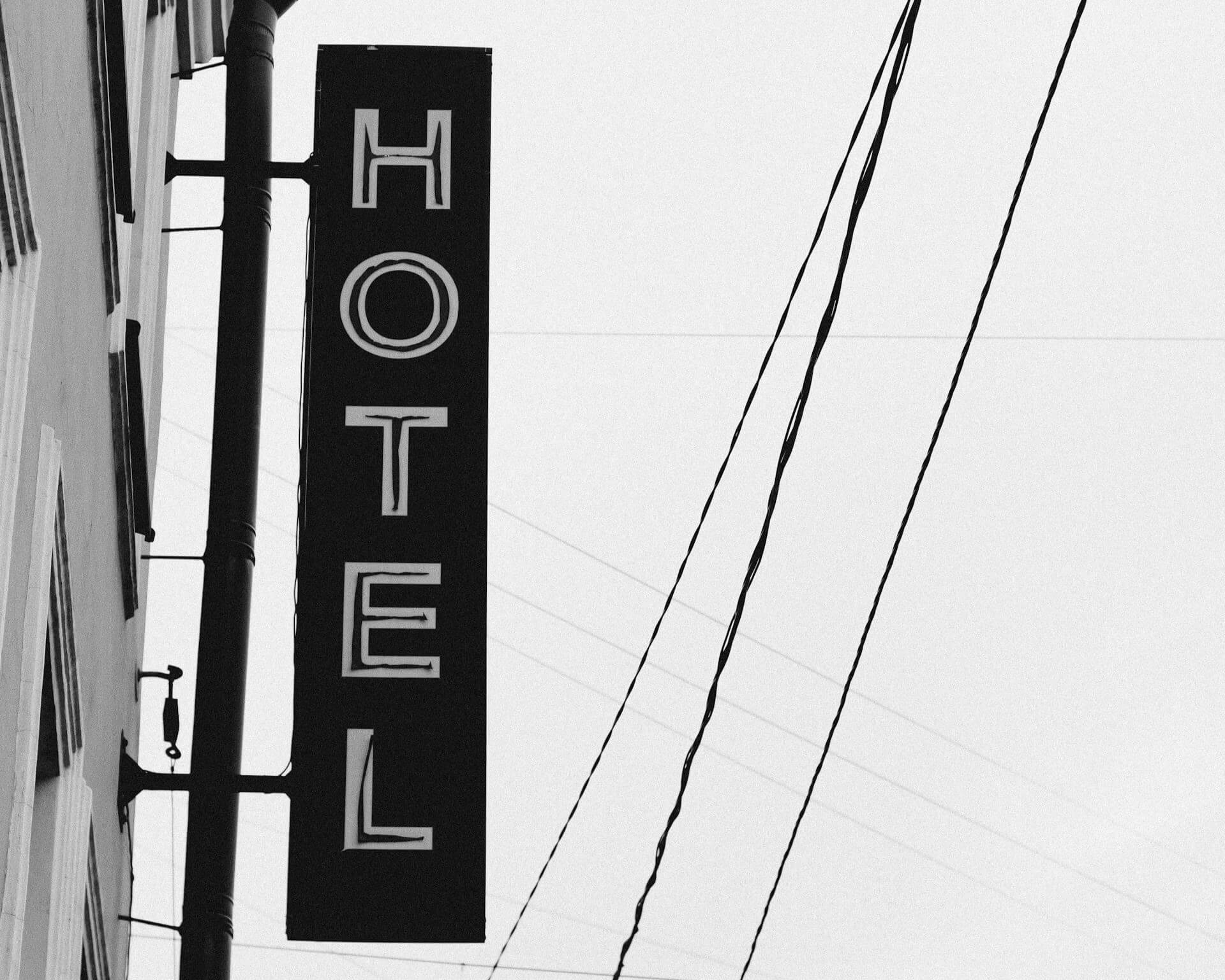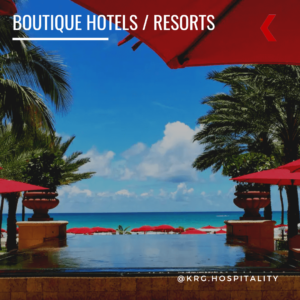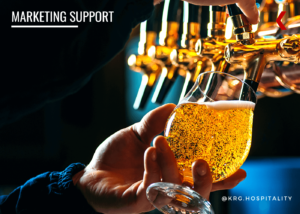Bar Hacks: ReFire: Episode 1, Part 2
by David Klemt

The second of three real-life hospitality scenarios discussed on the new Bar Hacks: ReFire podcast deals with onboarding.
More explicitly, I, along with cohost Bradley Knebel, client services director at Empowered Hospitality, look at a situation involving onboarding, training, leadership, culture, and potential imposter syndrome.
Our goal with every episode of ReFire is for listeners to gain valuable insights into bar, restaurant, and hotel operations.
Whether you’re a bar owner, manager, or aspiring hospitality professional, these episodes of Bar Hacks offer a wealth of knowledge and strategies to navigate the challenges of running a successful bar or restaurant.
Below, a transcript of the second part of the first episode of Bar Hacks: ReFire. For the lightly edited transcript of the first situation we addressed, click here. Bradley and I jump into each scenario cold (for the most part), so the tone is conversational rather than formal. In other words, they sound better than they read.
Cheers!
The ReFire Format
David: So, for the audience, what happened is, I sifted through… I’m basically going through online—there’s subreddits that, basically, everybody knows there’s a subreddit for everything. Good or bad, there’s a subreddit for it. Servers have a subreddit. Bartenders, chefs, bar owners, restaurant owners, hotel owners… I mean, they all have subreddits. And then there’s just, you know, forums all over the internet. You can find pretty much any topic. And so, I’m kind of sifting through these for real-world situations. And the caveat there is we’re gonna take these at face value, for the most part. Unless someone is like, “I’m just kidding,” like, “I got you all like in the comments…”
But we’re going to accept that these are really happening, because anyone in the industry knows if you’ve been in there, you know, for a few years, everything happens in this industry. So, a lot of this stuff is believable, even as outlandish as it might sound. The only thing I’m going to do, really, and Bradley’s going to do when we bring these topics up, is we’re not going to read them verbatim. We’re going to summarize. And the reason for this is I don’t want people to get doxxed. I don’t want them to, you know, get review bombed because someone decided, “I’m going to side with the server on this and let’s review bomb this operator.” You know, things like that.
So, we’re trying to be general but still get to the crux of the situation, and I’m sure they’ll get more specific as we go. I chose three to start with; hopefully, we get to all three. If we have a great conversation on, like, the first one or two, we’ll save the third one, or you know, however it works, for the next one. But that’s how this is gonna work. I’m sure it’ll evolve, ‘cause I’m not, like, a strict, like, “Oh, this is how it’s going to be” ‘cause it’s quote-unquote “my podcast,” because I’m not like that. We’re going to have fun with this.
Situation 2: Imposter Syndrome and Onboarding
David: So, situation two. This bartender, the way they phrased it, I don’t think they ever did a year straight with one employer. And I’m not saying that’s a bad thing. Like, it’s like you just said, it’s a transient business.
Bradley: Transient.
David: The experience they had was, I’m gonna go with, like, “high-volume,” but you know, it’s a college bar, a dive bar, which I… Apologies to Travis Tober, he does not like that term. He likes “neighborhood bar,” and I agree.
Bradley: I also could have felt like something like an Olive Garden or an Applebee’s, especially because they talk about how many steps there are.
David: Good point. It could be a neighborhood chain restaurant, and they’re behind the bar. That’s absolutely possible. It’s not the Baccarat Bar, we’ll just put it that way, where their experience came from.
They got hired by a more upscale, higher-end venue. They were given one training shift. And from what I could determine, the cocktails routinely had a minimum of six ingredients. So, lots of steps, and yet it was still high-volume because it was a popular bar.
So, it’s high-volume with a lot of steps, which.. That was cool, you know, call it a dozen years ago, 15, when, like, “Wow, I’m gonna wait ten minutes for this cocktail ’cause it’s supposed to be awesome.” Where now people are like, “I don’t care if it’s 30 ingredients, I want this thing in three seconds ’cause I’m not standing here, and your team is supposed to be high volume.”
So, they got the one training shift—that was it. And the ownership and leadership team appears to like to sit at the bar. And I don’t know if this is when they’re working; that wasn’t made clear. But the person feels they’re being scrutinized. They have questions. It sounds like they asked a question, at least one question, and got a very, in their opinion, terse and impatient reply. They now perceive this culture as they do not have patience for questions. “I have to just know my job. I’ve got to get these cocktails down. I have to be perfect.”
And I’ll kick this off by saying it is possible this person is just so in their head because it’s imposter syndrome, and they got one training shift, and now they, because it’s one training shift, are in their head, saying, “I have to be perfect now; I had my training shift. I can’t ask questions because I’m going to get fired or they’re going to give me less shifts because I don’t know, quote-unquote what I’m doing.”
So, it’s possible that just they’re not confident because they’re in their own head. However, that still had to come from somewhere. So, I do believe someone maybe—and I don’t even know—they gave him a short answer or a bit of a terse reaction because they’re just, maybe they’re having a bad day or they weren’t even thinking. They just threw an answer out and to them it’s not a big deal. It wasn’t a, a short or curt answer because that’s not how they meant it. They’re just like, “Yeah, you just do this,” and they walked away.
So, I think we both agree though that this does sound like we’re rubbing up on a culture issue, within the business. But they weren’t even trying to throw the ownership under the bus. They were just like, “Do I quit this job and go for something I’m more used to, or do I stick it out because this is more money?” It’s a higher-end venue, the tips are better. And I mean, the general consensus appeared to be like, “No, you stick it out. You can figure this out.” It’s bartending: If you did high-volume in an easy call bar, that’s still brutal. If you run a high-volume college bar, you’re getting destroyed. So, you should be used to it.
Just One Training Shift?!
Bradley: If it’s just Vodka Sodas all night, with splash of cranberry, or making, yeah, or you’re making, like, Death & Co. drinks to bring Dave back into the conversation, you know, bartending is hard. And, you know, there’s a reason that most volume bartenders, usually the higher volume the bar, the less touches there are. The less, kind of, ingredients per cocktail, right? It’s built for speed and efficiency.
So, I agree with you that this sounds a little bit like this person may be in their head a little bit, and maybe second-guessing themselves, or needing to build their confidence. But there’s a lot of things about this case that I think a lot of people can learn from. And the biggest flag to me is if this is an upscale cocktail bar, and if their signature ingredients have six- to eight-plus steps, which, first off, like, combine some of those into a cheater bottle or something. Like, come on, that’s crazy. But even if all of that is true, one training shift is absolutely not… Like, that, to me, is a huge flag. If I came into a bar, no matter if I’d been bartending for six months or six years, if I walked into a new space and they said, “Great, you get one shift, and now you’re on service bar,” like, that just is not a recipe for success, you know? And so, the reason that you and I kept talking about this being a cultural piece almost more than a training piece is, why is there only one training shift?
Are they just churning through people so fast that they literally just have to be live instantly because the owners are sitting at the bar constantly critiquing everybody? And are their cocktails built for their concept? And I think that is a big issue. If you have that many steps in your cocktails, but you have 150 covers in your space, like, there’s no way that those two things are going to meet. Even if you have 30 covers in your space, there’s no way that those two things are going to meet.
If it’s a purely cocktail bar where people are supposed to be coming in, and getting a bunch of different cocktails, and ordering something different every time. And so for me, from the employee standpoint, there are a few things that I would question, and I take issue with. Well, is this place set up to support me? You know, it’s funny because the last question, we talked all about the employer standpoint, right? Like, the employer standpoint against the employee. But it is a relationship. And it is, when we talk about interviewing a lot, right, that interviewing needs to be a dialogue. It isn’t just me asking you questions, you answering questions, and then “boom,” question two. It needs to be a dialogue.
And I think employment is a dialogue, right? You’re giving just as much to your employer as they should be giving to you. And that is in training, that is in culture. And so, how are they supporting you and your growth? And it sounds like here that they’re not, from a technical standpoint. And, like, I think it’s what probably most of the people on the thread were saying is, you can learn anything. You can learn all these cocktails.
Three Months
Bradley: Like, this is going to sound really dumb, but when I first started bartending, ’cause I am a virgo and a perfectionist and a Millennial, so, like, all those things just combined into a terrible mixture. But the first time I started bartending, I literally sat home. I didn’t have any pour spouts. So, I may or may not have borrowed them from work—I’m sorry, boss, I’m telling you this 20 years later—and put them into empty wine bottles. And I just practiced, because we also had to do counts instead of jiggering. And so I was just practicing until I figured out how it all kind of worked together.
And then the next thing is, you know, I tell people this all the time, that it takes three months just to figure out what your job is, and how to be good at it. Not to be good at it, just how to be. There’s different cultures, there’s different steps, there’s different people you’re dealing with.
How do I show up on time? What is my uniform? How do I get it cleaned? Where is everything set? What is my opening side work? When is lineup? Who are the regular guests? What do people usually order? What am I recommending? There are so many pieces of a job, especially in the dining sector, that come together that it takes you three months just to figure out. “Okay, what am I actually doing? How do I actually do it? What does success look like? What is my team here? And are they supportive or not supportive? And who can I lean on? And then also how do I get better?”
And then it takes another three months to get better. Whenever I’ve promoted a server assistant to a server, a server to a sommelier or a captain, you know, prep cook to a line cook, like, garde manger to, like, flat top, or if they’re looking, working on a grill. No matter what your promotion is, and actually the biggest one is from line level into management, right? So, like, going from a server or bartender into a manager for the first time is, give yourself some grace. It takes three months just to figure out what the heck is going on. Like, who’s here, who are the players, what am I doing, what’s important, how often do things rotate, how much do I really need to know these things? And that takes you another three months just to build that skill set. And so, if you’re working for an employer that gives you one training shift and then is critiquing you for not being perfect right off the bat, to me, that’s less of a flag of you not being a skilled bartender and more of a flag of this is maybe not a place that’s going to be supportive for knowing that the restaurant industry is so transient.
And the restaurant industry is a lot of times almost like the gig economy. Before that became my thing, it was the pre-gig economy. Are they going to be there to really help your growth, and as things change, and as you either get another bartending job—because very few bartenders have one job, they tend to have two or three. So, if you get another job, if you are in school, if you’re an actor or in some sort of artistic discipline and are going to need to go on show, how supportive are they going to be in view of that lifestyle? Or if you’re a dedicated bartender full-time, then this doesn’t sound like a bar that’s going to dedicate timing to you to grow.
So, my biggest pushback to this employee is, hey, get out of your head. You’re not going to be perfect. Like, you have to learn it. But is this a place that’s going to support you, or is it time to look somewhere else? Because I’ll tell you one thing—going to the last one (the first story of this episode). So, we’re in a talent shortage, still there. There is a plethora of jobs out there. And talk about the one job that’s almost most in demand on the front of house side, it’s bartenders. Bartenders who have done it for six months. When I was bartending and when I was hiring bartenders, especially pre-pandemic, if you didn’t have bartending on your resume for two years you wouldn’t get an interview. Now, if you’ve had bartending on there for three months, great, let’s go in. I’m going to ask you what a Cosmo is, and if you can answer, that’s question one, check. Different game.
Leadership Sitting at the Bar
David: And my one of my flags was: Why is management or leadership, if they’re sitting at the bar, I’m blown away by that. Like, what are you doing?
Bradley: That’s, that’s a revenue-generating spot. Yeah.
David: You just decided to voluntarily give up money. I don’t understand that. Like, what are you doing? And then do you micromanage everybody, or is it the bar team? And again, it’s perception. Like, did this person, every time they happen to look up because they’re not confident in themselves, perhaps do they think they’re being stared at by this team that’s not even looking at them? They just re looking around, like, “Hey, you need to touch that guest. That’s a VIP; we should go say hi. Those people look new, look like they’re having a blast. Let’s go introduce ourselves.”
We don’t know exactly what that was, but if you are micromanaging, I have a big issue with that because no one performs well under that kind of pressure, really. I mean, maybe a 20-year veteran bartender who’s like, “Yeah, you can micromanage me all you want, I don’t care. I’m gonna get this done, get my tips, and get out of here. Like, watch me all you want. I’m not doing anything, so go for it.”
But I do wonder… I mean, I don’t want, I don’t ever wanna see leadership or management lean against the bar, even a little. And sitting at the bar when they’re working, like, that’s not okay with me at all. I mean, yeah, you check in with the bar team, but you can do that from the side of the bar, you can go behind the bar, but to sit there… And now guests are like, “Why? Is this person, is this bartender not doing the right thing?” It just, it leads to a lot of questions either from the guest side, which you definitely don’t want, and from the team side, like, “Wow, this team, the leadership team, doesn’t trust me. And I (ostensibly) did nothing wrong, and they just are watching me like a hawk. Like, did I do something wrong?”
Like, it’s just, to me, it’s just too many questions. And I know there are people who, they’re micromanagers, but then maybe they need to be moved or spoken to or something. You just can’t do it that way anymore. It just doesn’t, it doesn’t work. And if you, if you are behaving that way, then why’d you hire this person? If you’re just going to watch them like that, then they shouldn’t have been hired or you’re in the wrong position, to be honest. Like, maybe you shouldn’t be a manager. Like, sorry, but that could be.
Coaching, Holding People Accountable, and Setting Standards
Bradley: I think there’s a big difference between coaching, holding people accountable, and setting standards versus micromanagement, right?
David: Absoutely.
Bradley: I think a lot of that—I mean, there’s a lot of very, I mean, specific differences—but I think it really comes from, are you doing it for the employee’s benefit, or are you doing it to control the output? Right?
So, you are never going to be able to replicate yourself. And this idea of people saying, “I need to find somebody who’s just like me, who’s going to do this just like I’m going to do so I don’t have to manage them,” is a fallacy. That’s not true.
It’s all about building standards, building practices, and holding people accountable, and coaching them in the moment, but not doing it through fear or doing it through anxiety. Because what does that do with somebody being watched, but they’re being watched with a knownn critical eye? Like, if somebody’s just being watched and, like observed, that’s one thing. If somebody’s being watched and observed where they know that they’re being nitpicked and critiqued, they’re going to fumble.
Think about it: No matter how confident you are, somebody comes in and says, “I’m going to rate you today.” The nerves happen. I mean, to use the Tokyo Olympics, like Simone Biles, even people at the highest caliber can get nervous when they know they’re being watched, and they know they’re being critiqued. And so, that has a whole separate issue. I just watched that documentary. But it really shows that we as human beings, we want to know our boundaries, we want to know what success looks like. We want to be helped and given the tools to achieve success. But if you’re just constantly nitpicking and aren’t, like, really helping me get there, then you’re just creating moments for me to have anxiety and get stressed. It’s just going to make me perform worse instead of better.
David: I did an assessment not long ago. Flew in, get there, and rumors already started like, I’m there to fire people. And that’s not what I… You’d have to, like, punch me in the face for me to be like, “You need to fire this person.” Like, that’s not what I’m there for. And turned out they had a platform they were using, and the bar team was really, they weren’t all outgoing [toward me]. When I was just trying to just talk and see what their guest service is like. How chatty they were. Just kind of watch them a little bit.
And the one bartender was like, “Oh, you’re from this company, right? You’re here to test us, right?” And I was like, “Do you want me to test you?” Like, what would I be testing on, cocktail builds? I’m like, “No, that’s not why. I don’t work for that company, and that’s not why I’m here. But if you want me to test you, I will.” And, then I got him to calm down, and he then totally relaxed. The rest of the bar team relaxed. So, yeah, if they even have an inkling that someone is in there to evaluate them, that’s a lot of pressure. I feel the same. I feel the same way when the client is watching me assess their team… They’re like, “Well, why is he watching that? Like, what does he see? Like, I feel pressure a little bit. I don’t want to screw up an assessment. Like, I don’t want to interpret this wrong. Yeah, it’s just pressure that you don’t need to put on someone.
Is There Even an Onboarding Process?
David: And also, before we on to the next one, it does make me think that there isn’t a onboarding process. And if there is, you have a training shift, and then now you’re a bartender. It’s like, okay, but if you’re micromanaging, I really don’t think that you have an onboarding process. Because if you did, you would trust the process, and let these people assimilate and get in their own grooves.
They’re not gonna work exactly how you expect them to. They’re bartenders, servers, whatever; they have their experience. They do what they’re gonna do behind the bar. They hold jiggers differently. They sometimes build cocktails a little bit differently. It just happens. So, I just don’t think that you actually have onboarding, and I definitely think, “Do you have manuals? Really?”If you are going to sit there and stare somebody down while they do their job that kind of brought that red flag where I don’t think there’s onboarding.
Bradley: I absolutely agree that there’s none. And I also have to wonder about people in that sort of environment. Because we’re kind of leaning towards we think that this is a pretty, maybe, aggressive micromanaging environment, which I think it is. At least, the person who wrote this thinks it is. But in those environments, too, the staff tends to band together a little bit, for better or for worse. And so I also wonder if he’s reached out to other bartenders. It’s like, “Hey, can you help me get this cocktail? I can’t figure it out.” Or, “How did you get faster at this?” Because, especially if it’s a tip pool, and whether tip pools exist in the restaurants at large or not, a lot of them in New York City do, but most bars are pooled in general just because it’s easier. And so, it incentivizes every other bartender to want you to be just as fast as they are. And so, is either this person too nervous to ask another bartender for help, or does the bar in general have a culture of just, kind of, like, sink or swim? Which, my very first server shift in my entire life was a sink-or-swin shift, and I had never served ever before. And I’ll tell you that that was a terrifying and terrible experience. Apparently I did okay, but it felt shitty the whole time.
So, culture starts the very first day. Culture starts, actually, during the interview process. And so, this employee doesn’t feel like they were set up for success. If they were set up for success, then they’re not the right fit for the company culture, where they just aren’t the right fit for what this bar is trying to do. But it also sounds like the owners, and/or management, and/or leadership could use a little bit of a, “Hey, you have to trust the team. You have to trust the process.”
“If you can’t trust the team, it’s the process that’s wrong.”
If you can’t trust the team, it’s the process that’s wrong. The training process is wrong. Your coaching and standards process is wrong. Your communication of systems is wrong, or you don’t have any. Also, again, there should never be a cocktail—and you, some people, will disagree with me, but then you can charge $50 for them—there shouldn’t be a cocktail that has that many steps to create. Especially if high-volume has anything to do with the bar concept.
David: Yep. There’s a bartender, bar owner out here in Vegas. They don’t like all the steps for a Sour, and they have developed a technique to remove one to two steps, make it that much faster. Their whole team knows it; anyone who’s working behind the bar there knows this technique. So, yeah, adding steps is… I have zero problem with keg cocktails. I think people for some reason think they’re hilarious. I mean, look at all the pour walls. People are like, “I’m gonna come to this bar and restaurant, and put money on a card to serve myself drinks.” Like, people like this kind of stuff. So, you can take steps out. Like you said, if you can can make housemade ingredients that much faster, then those are the right steps to take. And I’m sure the bar team would be like, “Yeah, we can do this if you’ll let us do it.”
Bradley: We had a rule that a drink on our menu should never have more than three touches. Right? You have the base spirit, you have one juice, and, you know, it was always, like, the combining of other ingredients, and then either one more or a bitters or something. Maybe you had four touches at the most. But you’re not sitting there trying to like reinvent the wheel every single time. If you always have a one-to-two ratio of a ginger syrup to some other juice, then just put it in a cheater, just put it in a bar bottle, and just have that two-to-one ratio because also you know it’s already measured, right? And so, prep, absolutely, just in the kitchen and in the bar, is the best recipe for success.
Going way off tangent for this topic, but it sounds like very little process exists here, right? There’s no onboarding process, there’s no training process. It seems like there might not be a good feedback process or coaching process. There’s definitely no bar process that I think is really setting the team up for success. Or this person is just so under-qualified and over-exaggerated that they came in and just, essentially, they’re like, “Oh, you’ve got this. You can do this in your sleep,” right? And then left. So, there’s something weird happening here. But I definitely think that it’s a mismatch between employer and employee.
“It’s all solvable.”
David: Yeah. And we’re not trying to roast the owner because we don’t know how much of this is true. Again, like I said in the beginning, we are taking these at face value, just as learning opportunities, really. So, it’s not like we’re like, “Oh yeah, this operator is terrible.” There does seem to be…there’s an issue. And again, the issue could literally just be this person is convinced they faked their way into this job ,and now it’s coming home to roost. And they have zero confidence because they’re trying to mask that: “Man, I probably don’t belong here.”
Which, again, I think is silly if you can learn this. And again, like, to your point, is the bar team cool enough to be like, “Hey, this impacts all of us. It impacts the servers. If this bar is slow and our drinks are slow, like, we all need to be…we can help you improve this.” Like, “Let’s do this.” And they obviously saw something in this person to hire them. I’m hoping it wasn’t just “here’s a body” if it’s a more upscale, higher-end spot.
So, that should tell them, hey, you got the job—nice. Gotta keep it. And you’ve done high-volume, most likely. If you worked in a college bar or a neighborhood bar, you’ve probably done volume. So, now it’s steps. It does suck: There are at least six ingredients in some of these signatures. Hopefully, there’s also, you know, people drinking G&Ts and Jack & Coke, and not a big deal. But this isn’t something that can’t be solved. And it’s either on the process side and leadership side, or it’s—
Bradley: Or it’s imposter syndrome.
David: Yeah, exactly. So, it’s just, what is the actual issue? It’s all solvable, is the great part of that one.
Note: Transcript provided by Eddy by Headliner, edited by author for clarity.
Image: Canva

Looking to Start, Stabilize, or Scale? Book Below to Setup a 60-Minute Result-Driven Impact Session.














